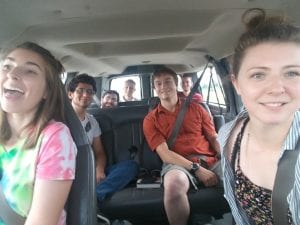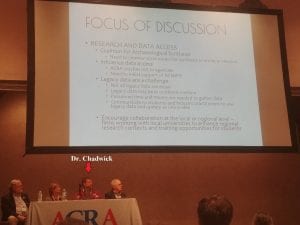By Kristina Gaugler
The American Cultural Resources Association (ACRA) is a national industry trade group whose primary mission is to advocate for the wide-ranging interests of the cultural resource management (CRM) industry. Complete with their own code of ethics and recommended best practices, ACRA members include a diverse group of large and small firms who work across the country in the CRM industry.
Second year graduate students in IUP’s Applied Archaeology program had the opportunity to attend ACRA’s conference this past September 6-9th. The conference was held in the beautiful French Art Deco styled Carew Tower, also called the Netherland Plaza Hotel in Cincinnati, Ohio. Unlike the many academic and research focused anthropological conferences that are held yearly, the ACRA conference is specifically geared to those who work outside of academia, in the private or public sectors of the CRM industry. It is for this reason that attending the conference was such a great experience as it provided valuable insight into the issues facing archaeologists working outside of the academic field. Students had the opportunity to sit in on a number of topics that ranged from how the current political climate was affecting the CRM industry, to how professionals should proceed in the wake of the #metoo movement. This conference also gave students the opportunity to network and engage with business owners and experienced CRM professionals in a relaxed and relatively informal atmosphere.
The first session of the conference was a discussion on the current political climate in Washington DC. and its impact on the CRM industry, specifically there was a long conversation on how the November mid-term elections could potentially impact the field. Topics that were considered included the current state of infrastructure funding, the push for stream-lining regulations within the administration, and the impacts of changing environmental policy regulations. Presenter Marion Werkheiser, ACRA’s Chief
Lobbyist, noted that the decisions being made in Washington have the potential to create more work for CRM professionals, especially if lands that were formerly protected are opened for development, but that efforts to stream-line undertaking these projects to create money saving short cuts, have the potential to be very destructive to cultural resources.
Session 5 was titled “Building Great Workplaces: How the #MeToo Movement is Affecting the CRM Industry.” This was an excellent discussion on the ways that not only management and business owners should handle the reporting of workplace misconduct or sexual harassment, but also the steps employees can take to be heard, and the legal ramifications of such conflicts. This session was presented by attorney Julie Pugh, which made for an extremely informative dialogue that was given from the perspective of the people who counsel, litigate, and resolve these types of issues. Pugh had a lot of valuable insight on how to handle these difficult situations appropriately, and within the bounds of the law.
The final session that I found particularly interesting was Session 10, which discussed the ways that the Academy and the CRM industry can promote “synergy” between each other. IUP Professor, Dr. William Chadwick was a panel member during this discussion as he has worked for many years as both an industry professional and as a university professor. A task force was created within ACRA to work towards accomplishing the goal of improving the relationship between CRM and the academy. This session had a lively discussion and audience members were very keen to share ideas and stories, as well as complaints with the panelists and each other. The consensus was of course, that there should much more collaboration between the two fields, however the exact method for promoting this is still debated.
By attending this conference students were given the chance to get an in depth look at the people, companies, and issues that make up the CRM industry. Unlike many other academic conferences, there were very few students in attendance at ACRA. I hope that in the future universities and companies alike can work to encourage more students to attend, as all of us at IUP found the conference to be valuable and fun!

Having fun on our drive to ACRA! Students from left to right; Jessie Hoover, Andrew Malhotra, Joseph Bomberger, Ross Owen, Christopher Thompson, Steven Campbell, Kristina Gaugler

